Starpath was a U.S. company known for creating the Starpath Supercharger in August 1982. The company was founded under the name Arcadia Corporation in 1981 by Alan Bayley, Robert Brown, and Craig Nelson. It changed its name to Starpath shortly after for trademark reasons because Emerson Radio Corporation had released a video game console named the Emerson Arcadia 2001.

The Starpath Supercharger is an expansion peripheral cartridge created by Starpath, for playing cassette-based proprietary games on the Atari 2600 video game console.
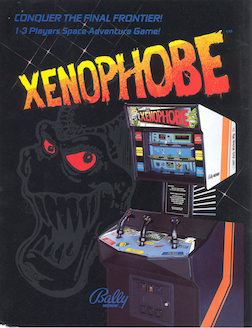
Xenophobe is a video game developed by Bally Midway and released in arcades in 1987. Starbases, moons, ships, and space cities are infested with aliens, and the players have to kill the aliens before each is completely overrun. The screen is split into three horizontally-scrolling windows, one for each of up to three players, yet all players are in the same game world.

Track & Field, also known as Hyper Olympic in Japan and Europe, is an Olympic-themed sports video game developed by Konami and released as an arcade video game in 1983. The Japanese release sported an official license for the 1984 Summer Olympics. In Europe, the game was initially released under the Japanese title Hyper Olympic in 1983, before re-releasing under the US title Track & Field in early 1984.
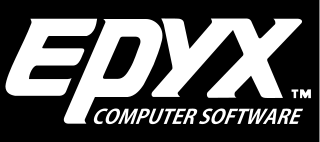
Epyx, Inc. was a video game developer and video game publisher active in the late 1970s and 1980s. The company was founded as Automated Simulations by Jim Connelley and Jon Freeman, originally using Epyx as a brand name for action-oriented games before renaming the company to match in 1983. Epyx published a long series of games through the 1980s. The company is currently owned by Bridgestone Multimedia Group Global.
The Epyx Fast Load is a floppy disk fast loader cartridge made by American software company Epyx in 1984 for the Commodore 64 home computer. It was programmed by Epyx employee Scott Nelson, who was originally a programmer for Starpath and later designed the Epyx Vorpal fastloading system for the company's games.
1982 was the peak year for the golden age of arcade video games as well as the second generation of video game consoles. Many games were released that would spawn franchises, or at least sequels, including Dig Dug, Pole Position, Mr. Do!, Zaxxon, Q*bert, Time Pilot and Pitfall! The year's highest-grossing video game was Namco's arcade game Pac-Man, for the third year in a row, while the year's best-selling home system was the Atari 2600. Additional video game consoles added to a crowded market, notably the ColecoVision and Atari 5200. Troubles at Atari late in the year triggered the video game crash of 1983.
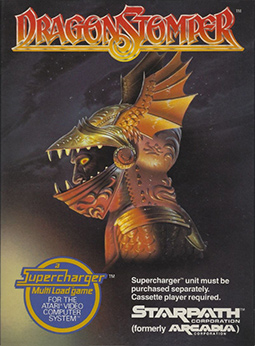
Dragonstomper is a video game developed by Stephen Landrum for the Atari Video Computer System and released by Starpath. The game follows the adventures of a dragon hunter who is given a quest by the king to defeat a dragon and reclaim a magical amulet that was stolen. The player makes their way over the countryside, vanquishing various adversaries and gaining gold and experience. After achieving enough strength, the player can enter a shop in an oppressed village where equipment can be purchased, soldiers hired, and special scrolls obtained to defeat the dragon in its lair.

Impossible Mission is a video game originally written for the Commodore 64 by Dennis Caswell and published by Epyx in 1984. The game features a variety of gameplay mechanics from platform and adventure games, and includes digitized speech. Impossible Mission, which casts the player in the role of a secret agent infiltrating an enemy stronghold, is widely considered one of the best games for several platforms.

One on One: Dr. J vs. Larry Bird, commonly known as One on One, is a basketball video game written by Eric Hammond for the Apple II and published by Electronic Arts in 1983. It was initially ported to the Atari 8-bit computers, ColecoVision, Commodore 64, and IBM PC compatibles. Versions followed for the TRS-80 Color Computer, Classic Mac OS, Amiga, and ZX Spectrum. In Europe, the publisher was Ariolasoft. Atari Corporation released an Atari 7800 port in 1987.
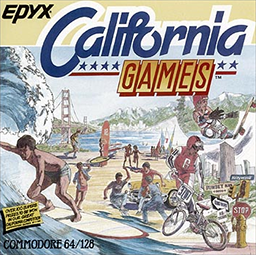
California Games is a 1987 sports video game originally released by Epyx for the Apple II and Commodore 64, and ported to other home computers and video game consoles. Branching from their Summer Games and Winter Games series, this game consists of a collection of outdoor sports purportedly popular in California. The game was successful and spawned a sequel, California Games II.
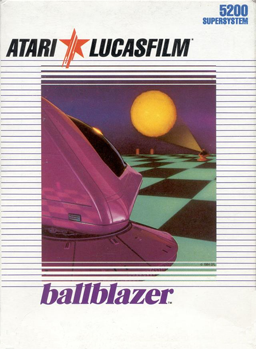
Ballblazer is a futuristic sports game created by Lucasfilm Games and published in 1985 by Epyx. Along with Rescue on Fractalus!, it was one of the initial pair of releases from Lucasfilm Games, Ballblazer was developed and first published for the Atari 8-bit computers. The principal creator and programmer was David Levine. The game was called Ballblaster during development; some pirated versions bear this name.
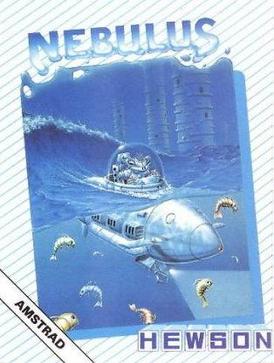
Nebulus is a platform game created by John M. Phillips and published by Hewson Consultants in the late 1980s for home computer systems. International releases and ports were known by various other names: Castelian, Kyorochan Land, Subline, and Tower Toppler.

Winter Games is a sports video game developed by Epyx, based on sports featured in the Winter Olympic Games.
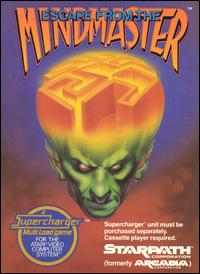
Escape from the MindMaster was a video game for the Starpath Supercharger addon for the Atari 2600 published in 1982 by Starpath.

Summer Games II is an Olympic sports video game developed and published by Epyx in North America, and published by U.S. Gold in Europe, based on sports featured in the Summer Olympic Games. It is a sequel to Summer Games released by Epyx the previous year. Summer Games II was originally written for the Commodore 64 and ported to the Apple II, Atari ST, MS-DOS, ZX Spectrum, Amstrad CPC and Amiga.
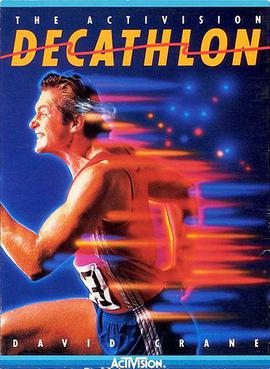
The Activision Decathlon is a sports video game written by David Crane for the Atari 2600 and published by Activision in 1983. It was ported to the Atari 8-bit computers, Atari 5200, Commodore 64, ColecoVision, and MSX. Up to four players compete in the ten different events of a real-life decathlon, either in sequence or individually.

Beach Head II: The Dictator Strikes Back is a 1985 video game for the Commodore 64, a sequel to Beach Head, developed and published by Access Software. It was designed by Bruce Carver and his brother, Roger, and was released for the Amstrad CPC, Apple II, Atari 8-bit family, Commodore 64, and ZX Spectrum.

Dandy is a dungeon crawl maze video game for Atari 8-bit computers published by the Atari Program Exchange in 1983. It is one of the first video games with four-player, simultaneous cooperative play. Players equipped with bows and unlimited arrows fight through a maze containing monsters, monster spawners, keys, locked doors, food, and bombs in search of the exit leading to the next level. If a player dies, they can be revived by finding and shooting a heart. The game includes an editor for making new dungeons.

















